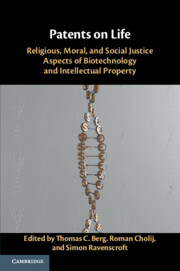 Patents on Life
Patents on Life from I - Life Patents, Law, and Morality
Published online by Cambridge University Press: 28 September 2019
Article 53 of the European Patent Convention prohibits the grant of patents for plant or animal varieties and for inventions whose commercial exploitation would be contrary to ordre public or morality. These provisions are therefore both criteria for the grant of patents and grounds for opposing granted patents. The interpretation of these provisions and their application to particular cases lies ultimately in the hands of the Boards of Appeal of the European Patent Office which have considered both patent applications and oppositions against granted patents on these grounds. This chapter begins with a summary of the law, the procedure for opposing patents on these grounds and the principal decisions in this field. It then reviews the manner in which opponents of patents other than commercial parties – such as pressure groups, political parties and churches – have organised themselves as opponents. Lastly, it considers how these non-commercial opponents have conducted their cases, their degree of success, whether they could do more to question the grant of life form patents – and whether, as the author considers they should, churches and other organisations with ethical credentials should actively question life form patents.
To save this book to your Kindle, first ensure [email protected] is added to your Approved Personal Document E-mail List under your Personal Document Settings on the Manage Your Content and Devices page of your Amazon account. Then enter the ‘name’ part of your Kindle email address below. Find out more about saving to your Kindle.
Note you can select to save to either the @free.kindle.com or @kindle.com variations. ‘@free.kindle.com’ emails are free but can only be saved to your device when it is connected to wi-fi. ‘@kindle.com’ emails can be delivered even when you are not connected to wi-fi, but note that service fees apply.
Find out more about the Kindle Personal Document Service.
To save content items to your account, please confirm that you agree to abide by our usage policies. If this is the first time you use this feature, you will be asked to authorise Cambridge Core to connect with your account. Find out more about saving content to Dropbox.
To save content items to your account, please confirm that you agree to abide by our usage policies. If this is the first time you use this feature, you will be asked to authorise Cambridge Core to connect with your account. Find out more about saving content to Google Drive.